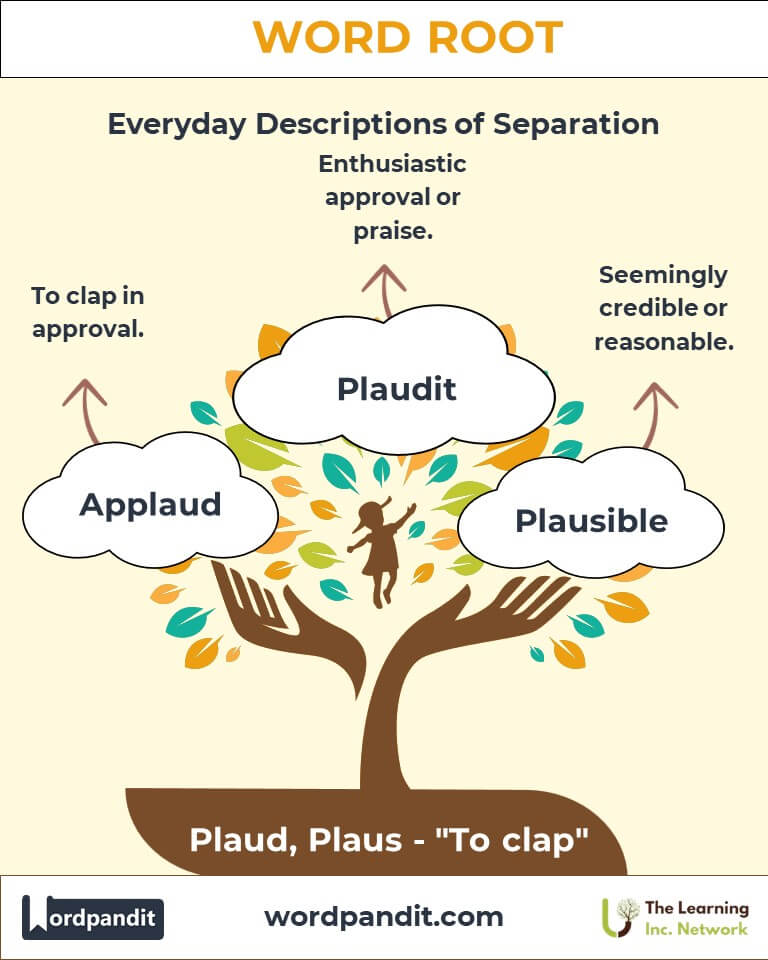Plaud, Plaus: The Applause of Language and Expression
Discover the charm and energy of the roots "plaud" and "plaus," derived from Latin, meaning "to clap." From the heartfelt recognition of "applaud" to the intellectual appeal of "plausible," these roots resonate in words that evoke approval, appreciation, and credibility.

Table of Contents
- Introduction: The Essence of Plaud and Plaus
- Etymology and Historical Journey
- Mnemonic: Unlocking the Power of Plaud and Plaus
- Common Plaud and Plaus-Related Terms
- Plaud and Plaus Through Time
- Plaud and Plaus in Specialized Fields
- Illustrative Story: Plaud and Plaus in Action
- Cultural Significance of Plaud and Plaus
- The Plaud and Plaus Family Tree
- FAQs about the Plaud and Plaus Roots
- Test Your Knowledge: Plaud and Plaus Mastery Quiz
- Conclusion: The Living Legacy of Plaud and Plaus
1. Introduction: The Essence of Plaud and Plaus
Imagine the thunderous applause of an audience or the quiet nod of approval when an idea seems plausible. The Latin roots "plaud" and "plaus" capture these moments of appreciation and credibility. Whether clapping hands or crafting convincing arguments, these roots enrich our language with expressions of recognition and validation.

2. Etymology and Historical Journey
The roots "plaud" and "plaus" stem from the Latin verb plaudere, meaning "to clap" or "to strike with approval." In ancient Rome, applause symbolized public approval in theaters, assemblies, and courts. Over time, these roots evolved into terms reflecting both literal clapping and metaphorical endorsement, becoming embedded in languages across Europe.
3. Mnemonic: Unlocking the Power of Plaud and Plaus
Picture a standing ovation at a grand theater, with hands clapping loudly for a stellar performance. This is the essence of "plaud" and "plaus."
Mnemonic Device: “Plaud and Plaus clap for ideas, actions, and achievements.”
4. Common Plaud and Plaus-Related Terms
- Applaud (uh-PLAWD): To clap in approval.
Example: "The audience applauded her inspiring speech." - Plausible (PLAW-zuh-buhl): Seemingly credible or reasonable.
Example: "His explanation for the delay was plausible." - Explode (ek-SPLOHD): To burst or release energy, metaphorically stemming from "clapping outward."
Example: "The fireworks exploded in a brilliant display." - Plaudit (PLAW-dit): Enthusiastic approval or praise.
Example: "The director received plaudits for the groundbreaking film." - Implausible (im-PLAW-zuh-buhl): Not believable or convincing.
Example: "Her excuse for missing the deadline seemed implausible."
5. Plaud and Plaus Through Time
- Plaudit (Historical): Originating from the Latin plaudite ("clap your hands"), it was once used in Roman theaters to cue applause at the end of performances.
- Explode (Evolution): Initially meaning "to reject with clapping," it shifted to signify bursts of energy or force in the 17th century.
6. Plaud and Plaus in Specialized Fields
- Law and Debate:
Term: Plausible
Usage: Used to describe arguments that appear credible, essential in courtroom strategies and public discourse. - Theater and Performance:
Term: Plaudit
Usage: Awards and critical praise for outstanding performances. - Science and Technology:
Term: Explode
Usage: Refers to rapid releases of energy in physics and engineering.
7. Illustrative Story: Plaud and Plaus in Action
At a local debate competition, young Ella presented a bold yet plausible solution to climate change. Her ideas were met with skeptical silence—until a lone clap turned into a standing ovation. The applause echoed through the hall, a testament to the power of blending credibility and inspiration.
8. Cultural Significance of Plaud and Plaus
The act of clapping as a form of approval transcends cultures and centuries. From Roman amphitheaters to modern award ceremonies, applause symbolizes unity and appreciation. Words like "applaud" and "plaudit" connect us to this enduring human tradition of recognizing excellence and effort.

9. The Plaud and Plaus Family Tree
- Clam (Latin: "to shout"):
- Proclaim: To announce publicly.
- Cred (Latin: "to believe"):
- Incredible: Unbelievable or extraordinary.
- Laud (Latin: "to praise"):
- Laudable: Worthy of praise.
FAQs About the "Plaud/Plaus" Word Roots
Q: What do "plaud" and "plaus" mean?
A: The roots "plaud" and "plaus" come from the Latin verb "plaudere," meaning "to clap" or "to strike with approval." These roots signify physical clapping as well as metaphorical approval or credibility, forming the basis for words like "applaud" and "plausible."
Q: What is the origin of the word "applaud"?
A: "Applaud" originates from the Latin "applaudere," combining "ad-" (toward) and "plaudere" (to clap). It initially referred to physically clapping hands in appreciation and later expanded to include broader forms of praise.
Q: How is "plausible" used in modern language?
A: "Plausible" describes something that appears reasonable or credible. For example, "His explanation seemed plausible, given the circumstances." It emphasizes logical believability.
Q: What does "implausible" mean?
A: "Implausible" is the opposite of "plausible," meaning not believable or lacking credibility. For instance, "Her story was so far-fetched it seemed implausible."
Q: Is the word "explode" related to these roots?
A: Yes, "explode" comes from the Latin "explodere," originally meaning "to reject with clapping." Over time, its meaning shifted to describe sudden, forceful bursts, like fireworks or loud noises.
Test Your Knowledge: "Plaud/Plaus" Word Roots Quiz
1. Which term describes a harsh rejection with clapping in its original sense?
2. What does "plausible" mean?
3. What do "plaud" and "plaus" signify?
4. What is the opposite of "plausible"?
5. What is a "plaudit"?
12. Conclusion: The Living Legacy of Plaud and Plaus
The roots "plaud" and "plaus" resonate in our language as symbols of recognition and validation. From literal applause to metaphorical approval, they remind us of the human need to celebrate and validate ideas, performances, and achievements. As these roots continue to evolve, they inspire us to express our appreciation and seek credibility in all we do.












